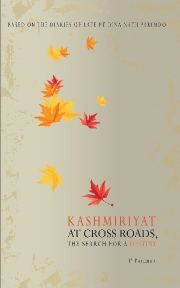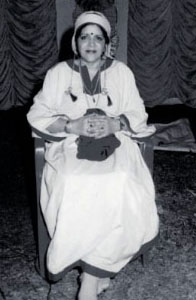Kashmiriyat at cross roads

| ||||
| BOOKS & PUBLICATIONS | ||||
|
| ||||
|
Format: | ||||
| | ||||
| Glimpse from the Book | ||||
|---|---|---|---|---|
| The gentle shaking woke me up from my post lunch nap, my bride of a few months Lilla was smiling one of her rare smiles. It was a sunny bright Sunday of yet another Spring in the valley.
A few cups of Sheer chai with the tasty bites of Telvaroos were the perfect accompaniment to the visual feast offered by the lightly and delicately hued profusion of almond owers; the dreamy purple haze and the pinkish white almond owers were in abundance and on that Sunday at their perfection. We witnessed a rare Spring sight- large patches of lawn littered with innumerable white little daisies in the bright sunshine. Truly,Spring is beautiful everywhere but the Spring in Kashmir is more beautiful than anywhere particularly on a bright Sunday, unspoilt by an overcast sky. Life felt so rich, so happy and so fulflling. | ||||
| | ||||
| About the Book | ||||
| Liberally laced with anecdotes and personal encounters of the author, Kashmiryat at cross roads…..,is an attempt to showcase the distinct way of life of a distinguished society, struggling to assert its individuality in a changed World. The firsthand account of the author transports the reader to Kashmir of olden times providing glimpses into the life of an ordinary Kashmiri, the culture, history, socio-economic conditions ,the political scenario and a spirituality of unique Kashmiri flavour. Sculptured by social mores, highly charged with spiritual fervor cutting across the barriers of Islam, Hinduism and Buddhism, it is the story of a cultural legacy struggling to keep its head above the swirling waters of anonymity surrounding it. The book attempts to encapsulate an aeons old history to focus on circumstances that led to a political vacuum which lasted till 1930. The seeds of the degenerative process which led to this vacuum having been sown way back in circa 830 A.D. surprisingly by two women, both famous for their feminine viles and charms. The rise of Sheikh Mohammed Abdullah, Kashmir’s leader with a mass following and the several futile attempts to belittle this giant, are written about as candidly as are the blunders on the part of Mr. Mohammed Ali Jinnah and India’s leaders and bureaucrats dealing with the sensitive Kashmiris and their sensibilities. Description of a hazardous 14 day journey on foot and pony in 1930’s involving the frightful crossing of Zojilla pass and facing the snow storm of Drass plateau, brings forth the nostalgic memories and romance of adventurous travel through the Himalyan range. The ages old life style of innocent Ladakhis, surrounded by an atmosphere saturated with mysticism and superstitions to which the author himself succumbed is graphically described by the author. Not forgetting the people who delivered Kashmir from its most brutal colonial past under Afghans, the Author pays a glowing homage to the Martyrs who laid down their lives and sacrificed their families to achieve the goal of throwing down the yoke of a cruel colonialism. | ||||
| | ||||
| About the Authors | ||||
| This book is written by P Parimoo and is based on the diaries of his father, the late Pandit Dina Nath Parimoo. Pt Dina Nath Parimoo was born in Srinagar on July 1, 1911 and lived in Kashmir till he retired at the age of 58. He was an educationist working with the Jammu and Kashmir government and was posted at various locations across the State during the tenure of his service, including Leh, Kargil, Udhampur, Poonch, R S Pura and his favourite Badgam district, where he spent several years as District Education Ofcer. He was a person of sharp intellect and an able orator, writer and poet. These qualities brought him recognition, admiration and respect from some of the most famous poets and politicians of Kashmir of his time. He thus had earned their trust and the opportunity to interact closely with several well known personalities and opinion makers of Kashmir. The pen was his most important asset. He was frequently invited to speak on Radio Kashmir and his articles were eagerly sought for magazines and events commemorating dignitaries of Kashmir, poets like Azad, Mahjoor, spiritualists like Master Zind Kaul, and Pt Gopi Kishen, even after his retirement, when he was staying in Mumbai or Ahmedabad. He remained quite active even in Ahmedabad,getting involved with its politics, the Peace council and Urdu mushairas and majlisis. Pt D N Parimoo was an individualistic person with strong views and opinions very often at variance with the views held by the conservative society he lived in. After his retirement he moved to Mumbai where his younger son was based and later, he shifted to Ahmedabad to live with his elder son, P Parimoo, the editor and co-author of this book. At the request of his elder son, Pt D N Parimoo in the year 1994 started writing his diaries about his experiences of life in Kashmir. This book is his story of Kashmir, full of vivid descriptions of his 1st-hand experiences in Kashmir in the 1st half and till the middle of 20th century. It takes the reader to Kashmir in the olden days with rich glimpses into the life of an ordinary Kashmiri, the culture, history, social and economic conditions, the political scenario, spirituality and religion. It also gives graphic details about life in Leh and Kargil, where he lived for a few years. Pt.D.N.Parimoo passed away on 15th August 2002 in Ahmedabad. P Parimoo P Parimoo, son of the author Pt D N Parimoo, is the person responsible for compiling his father’s rich experiences noted in his various diaries and presenting them in the form of a book. P Parimoo was born in Srinagar and did his schooling and graduation from Srinagar before moving to Mumbai for training as a textile engineer. Since the beginning of his career he remained mostly outside Kashmir but did his most to keep in touch with Kashmir and also to keep the more logical and appealing traditions of Kashmiriyat alive in his home. He is married to Krishna Badam, also born and brought up in Srinagar. He worked at senior management positions in the Indian industry. As a part of his profession, he lived in Germany for several years and also travelled extensively across the world. He retired as General Manager of Reliance Industries Ltd, Ahmedabad. Though a technocrat by training and calling, P Parimoo is an avid reader of history, particularly the history of religions. At the time of this writing he is researching the Pagan religions of Europe, strong telltale evidences of which he found in the north-western region of the French province of Alsace. It can easily be said that history of cultures is his first love. | ||||
|
| ||||
| Copyrights ? 2007 Shehjar online and KashmirGroup.com . Any content, including but not limited to text, software, music, sound, photographs, video, graphics or other material contained may not be modified, copied, reproduced, republished, uploaded, posted, or distributed in any form or context without written permission. Terms & Conditions. | ||||
 Kashmiriyat at cross roads; the search for a destiny
Kashmiriyat at cross roads; the search for a destiny
